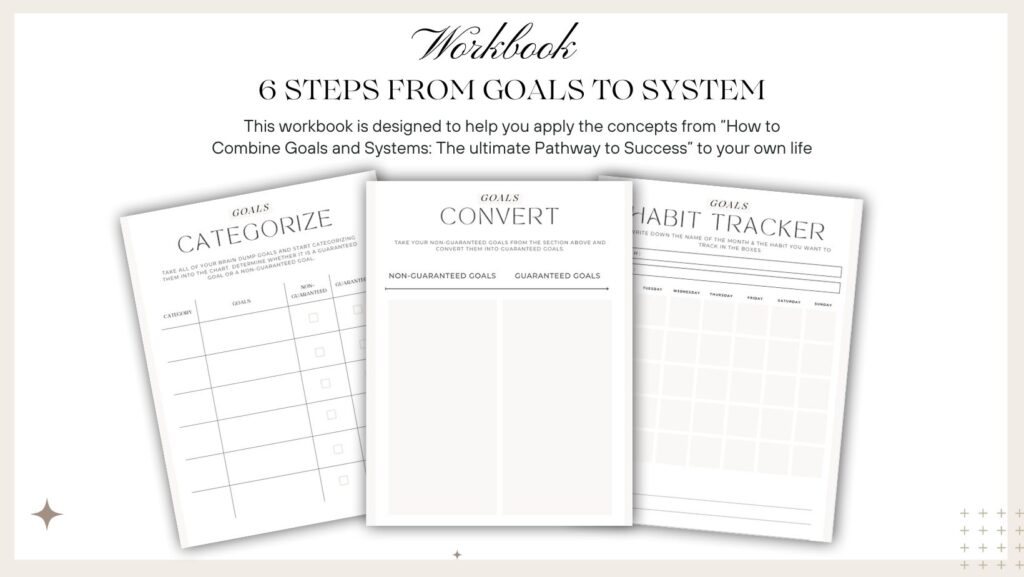How to combine goals and systems: The ultimate pathway to success
Share
We’ve seen a lot of videos and articles about Goals vs. Systems and which is better. However, without goals, there is no basis for creating your system. Today we wanted to go over how to combine goals and systems for a better pathway to success!

1. The Problem with Goals

Result oriented
One of the main problems with goals is that it is result oriented. This means that you don’t get any satisfaction until you achieve the goal. If your goal is to become valedictorian, you won’t be happy until you become one. Instead, embrace the process of becoming a valedictorian. Rather than making sure you have all A’s, try to enjoy gaining new knowledge and valuable study skills.
Goals by themselves won’t get you anywhere
Just thinking about a goal will get you nowhere unless you take action. Goals are powerless without the work that is put into achieving them. We could think all day about becoming the fastest runner in the world while sitting on a couch.
Limiting your potential
We should aim to be better than our goals! If your goal is to win the next marathon, you’re limiting yourself to beating your competition. Instead, you can achieve greater things if you try to keep increasing your running speed.
Goals are not guaranteed
Depending on the result, you could end up failing. For example, If your goal is to win a gold medal in an Olympic sport, you’ll likely fail. After all, only one person will win! Focusing on goals that are not guaranteed could lead to a loss of motivation when you fail.
2. When can Goals be helpful?

Sets the trajectory
Goals are good when they provide direction. If your goal is to win the next marathon, you’ve at least set the trajectory of becoming a better runner.
Guaranteed vs. Non-Guaranteed Goals
The key is to translate your non-guaranteed goals into things that you can accomplish. In this case, winning the next marathon is not guaranteed, but becoming a better runner is guaranteed as long as you make small daily progress.
3. Why Good systems equal long term success

Small steps add up
If you build good systems, you’ll only get better over time. To read more, you should build a daily reading system in small chunks. Even if you read 15 minutes daily, it’ll add up to 7 and a half hours of reading time in one month. This would be enough to finish a short book. Without a system, you might read for several hours on the first day, only to get burnt out and quit.
Fulfillment from daily improvements
Good systems help promote satisfaction and fulfillment for your small improvements! For example, if you’re trying to build endurance to run longer, you could decide to set a plan to run one more minute each day. Every day, you’re guaranteed to fulfill your aim of running one more minute. This is much more satisfying than setting a goal to be able to run 30 minutes by the end of the month.
Becomes Habitual
Your systems should help you to achieve small progress bit by bit. What is even better is when it becomes habitual, so you don’t have to think about them anymore.
Let’s imagine you have the original goal of running 5 miles in one go. You develop a system where running every day becomes habitual, and you slowly increase your distances daily. In 5 years, you will likely surpass the small goal of 5 miles into 20 miles or more!
There is limitless potential on achieving sustainable long-term success with a system that becomes habitual.
4. How to develop good systems?
Plan it out
Planning it out first is a good idea to ensure you have a good system. Write out your plan of progression. Decide what exact steps you are planning to take.
Make it easy
Make sure your system feels easy! If you make it difficult, you will give up on it. To read more, you could start by just opening your book at a certain time of day. Opening a book every day is the easiest step in the process of reading more. Once this becomes habitual, you can add to it by reading one more page. Make sure you don’t add more to the system until it is ingrained in your daily routine.
Don’t follow a specific timeline
Don’t form a specific timeline, as everyone has different speeds at which habits can form. Experts say it will take 21-66 days and possibly over 200 days until a behavior is habitual. If you aim to become a better writer, start by simply opening your notebook and moving on in your progression in your own time.
Track your progression
This is where habit trackers can be incredibly useful! Try to track your progression by noting it down each day. When you have a log of your system and reflect on how it is going, you can see how something small can turn into a huge change. For example, if you’re trying to build your running endurance, note how many minutes you run each day. If you’re trying to run one minute more each day, you have written documentation of your gradual progress which can be incredibly satisfying!
5. 6 steps from Goals to Systems
When you combine useful goals with a solid system, your potential for improvement is limitless.

We have created a pdf guide, “6 steps from goals to systems,” to help you apply the key concepts in this article to your own life. Be sure to check it out here! It includes a 6-step method to start creating a system that works for you.